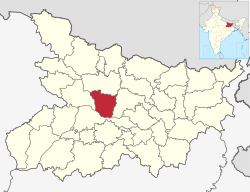Vaishali District
|
Vaishali district वैशाली जिला ضلع ویشالی |
|
|---|---|
| District of Bihar | |
 Location of Vaishali district in Bihar |
|
| Country | India |
| State | Bihar |
| Administrative division | Tirhut |
| Headquarters | Hajipur |
| Government | |
| • Lok Sabha constituencies | Hajipur, Vaishali |
| • Assembly seats | Hajipur, Lalganj, Vaishali, Mahua, Raja Pakar, Raghopur, Mahnar, Patepur |
| Area | |
| • Total | 2,036 km2 (786 sq mi) |
| Population (2011) | |
| • Total | 3,495,249 |
| • Density | 1,700/km2 (4,400/sq mi) |
| Demographics | |
| • Literacy | 68.56 per cent |
| • Sex ratio | 892 |
| Major highways | NH 19, NH 77, NH 103 |
| Website | Official website |
Vaishali district is a district in Bihar, India. It is named after the ancient city of Vaishali of Mithila, which is mentioned in the Mahabharata as well as in Buddhism and Jainism. It is a part of Tirhut division.
Vaishali derives its name from King Vishal. Even before the advent of Buddhism and Jainism, Vaishali was the capital of the vibrant Licchavi Republic, a sovereign state since before the birth of Mahavira (c. 599 BC), which suggests that it was perhaps the first republic in the world, similar to those later found in ancient Greece. In that period, Vaishali was an ancient metropolis and the capital city of the republic of the Vaishali state, which covered most of the Himalayan Gangetic region of present-day Bihar. Very little is known about the early history of Vaishali. The Vishnu Purana records 34 monarchs of Vaishali, the first being Nabhaga, who is believed to have abdicated his throne over a matter of human rights and believed to have declared: "I am now a free tiller of the soil, king over my acre." The last among the 34 was Sumati, who is considered a contemporary of Dasharatha, father of the Hindu god, Rama.
Numerous references to Vaishali are found in texts pertaining to both Jainism and Buddhism, which have preserved much information on Vaishali and the other mahajanapadas. Based on the information found in these texts, Vaishali was established as a republic by the 6th century BCE, prior to the birth of Gautama Buddha in 563 BCE, making it the world's first republic.
...
Wikipedia
